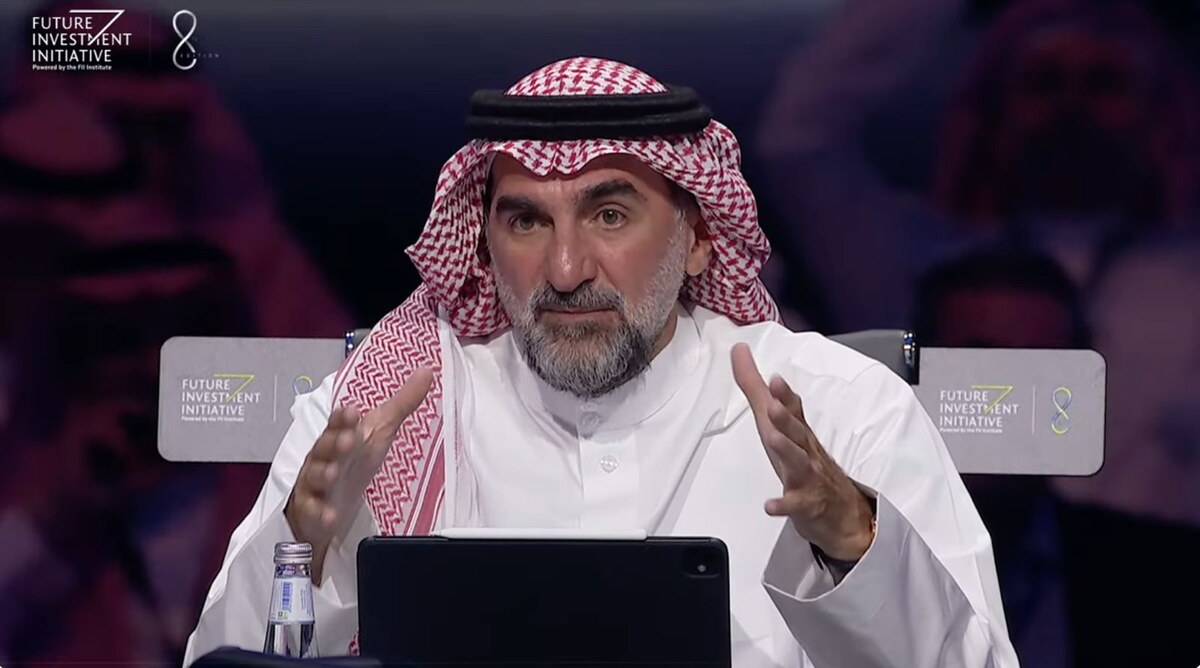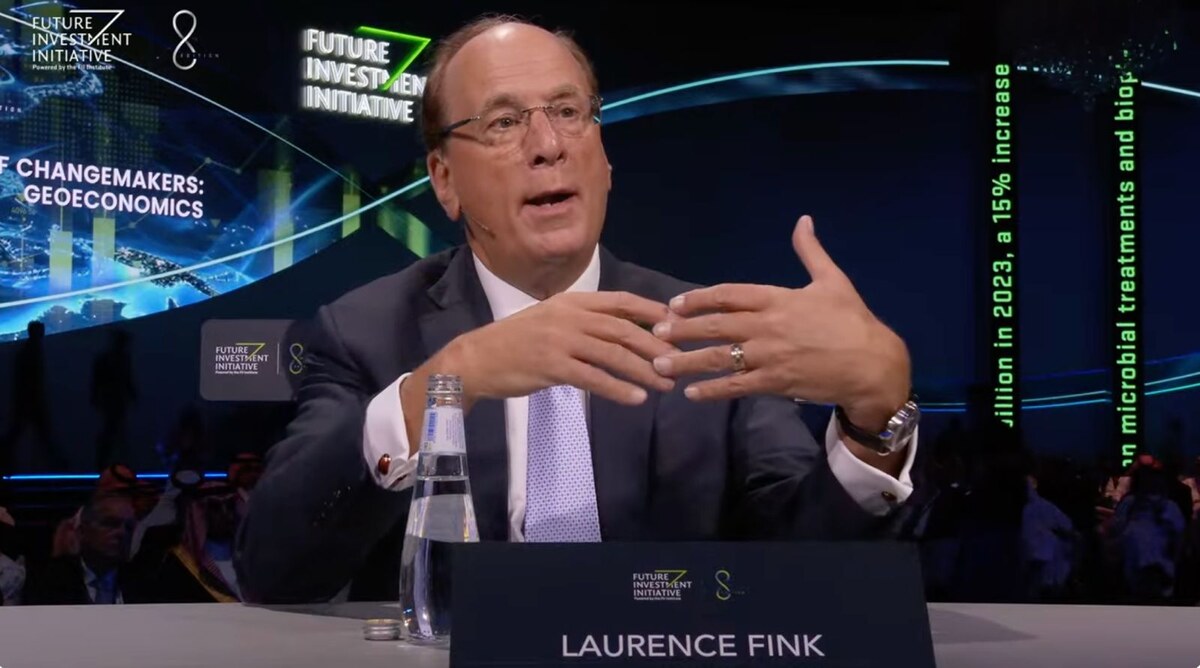RIYADH: Future Investment Initiative Institute CEO Richard Attias is stepping down from the role, he announced on the opening day of the eighth FII forum.
Addressing an audience of global leaders and investors, Attias expressed gratitude for his journey with FII and said he would leave the position by the end of 2024.
In his remarks the executive, who joined FII as CEO in January 2020, emphasized the importance of passing the baton to the next generation.
“Thank you for allowing me to be part of this incredible journey. It has been the honor of a lifetime,” he said.
Attias opened the event with a message highlighting the potential and ambition driving the summit’s agenda: “When we speak of infinite horizons, we are not merely picturing vast landscapes.”
He added: “We are invoking the limitless possibilities that define our human spirit.”
Describing the theme of “Infinite Horizons” as an invitation to imagine new futures, Attias said: “The horizon is not an end; it’s an invitation, an invitation to push the boundaries of what we believe is possible and to shape the future that reflects our highest ambitions.”
He urged attendees to lead with vision and drive: “Today, we call on each of you to be the leaders who do not see the world as it is, but as it could be.”
Reflecting on the FII’s transformative impact since its start in 2017, Attias celebrated the event’s role as more than a forum for dialogue. “Since its inception, FII has transcended beyond just discussions, becoming a transformative force for action, progress, and solutions,” he said.
Governor of the Public Investment Fund, Chairman of Saudi Aramco, and Chairman of the FII Institute, Yasir Al-Rumayyan, built on Attias’s remarks, emphasizing the need for interconnected solutions in an increasingly complex world.

Chairman of the FII Institute Yasir Al-Rumayyan. Screenshot
“Today, we face challenges that are no longer isolated but interconnected,” Al-Rumayyan said.
He explained that these challenges open new pathways for progress and encapsulated the ambition of this year’s theme, and highlighted the responsibility of investing with purpose, saying: “We have the responsibilities and the opportunities to shape a future that invests not only in our economies but in humanity itself.”
Stressing the role of emerging markets, the FII Institute chairman said: “By 2030, it’s projected that the growth of emerging markets’ economies will outpace developed markets.” This shift, he explained, “underscores the need for strategic investments in places that will drive tomorrow’s global economy.”
Artificial intelligence emerged as a focal point in the speech, with Al-Rumayyan highlighting its transformative economic potential. “AI alone could add nearly $20 trillion to the global economy by 2030,” he projected, adding that by 2027 “AI’s role as an economic driver will become a benchmark of national power.”
He also emphasized the energy sector as a prime example of purposeful investment, saying: “Our goal is not just to fuel economies, but to empower a future where energy sustains progress and well-being for generations to come.”
Al-Rumayyan underscored the importance of aligning government policies with fiscal strategies to achieve sustainable impact, calling this alignment the “new frontier where purposeful investments meet sustainable impact.”
Highlighting global investment trends, Al-Rumayyan pointed to data from the FII Priority Compass, underlining that while rising living costs remain a top global concern, “climate change is now the fourth highest priority globally.”
At the FII Institute, he pledged a continued commitment to inclusivity, stating: “Investing with purpose means creating a new standard where financial returns and human progress go hand in hand together.”
He urged investors and directors alike to view challenges as opportunities for transformative impact: “As leaders and global investors, we can transform today’s challenges into tomorrow’s opportunities.”
Later, in a roundtable discussion, Al-Rumayyan reflected on the evolution of Saudi Arabia’s investment strategy. “A lot of people would come looking for our money to be invested abroad. But that has shifted over the years; now we’re more focused on the domestic economy.”
Over the past eight to nine years, PIF has increasingly concentrated on local initiatives, transforming Saudi Arabia’s economic landscape and altering global perceptions. “Most of our projects are getting operational and commercial, and people are seeing the difference between their perception of Saudi Arabia back in 2015 and now,” he said.
The Kingdom’s economy, Al-Rumayyan underlined, is among the fastest-growing globally. “In 2022, we were the fastest-growing economy in the G20, growing by more than 7 percent,” he said, adding that projections place the nation among the top performers in the G20 in the years to come.
To balance global and domestic investments, he explained that PIF aims to adjust its international investment share from 30 percent to a target range of 18-20 percent.
Al-Rumayyan highlighted the Kingdom’s strategic positioning as an international economic nexus, describing the country’s unique advantages.
“Saudi Arabia is very well-positioned to be a global hub, not only a regional hub,” he said, listing factors such as efficient energy use, low energy costs, and extensive resources, including advanced technologies and renewable energy potential.
He emphasized the scale of backing required for infrastructure growth globally, pointing to a massive $9 trillion in money markets awaiting investment.

Laurence Fink, CEO of BlackRock. Screenshot
Laurence Fink, CEO of BlackRock, echoed this sentiment, calling the current period an “investment blossoming.” Fink highlighted robust earnings growth and the alignment of profits with price elasticity, signaling that global markets are witnessing sustained growth.
AI’s transformative potential was a recurring theme, explored further by other tech leaders. Ruth Porat, president and chief investment officer of Alphabet and Google, described AI as a “transformational, generational technology,” urging leaders to rethink what is possible in an era of advanced systems.
Former Google CEO Eric Schmidt commented on AI’s future in defense, suggesting a redefinition of warfare, where automation could transform traditional combat roles.
“War is today defined stereotypically as man shooting another man. If you’re a computer scientist, this makes no sense. The guns should be automated, and people should be drinking coffee somewhere else,” Schmidt said.
The FII event continues until Oct. 31, with leaders and investors engaging in discussions underscoring the commitment to purposeful investment as a driver for sustainable impact, human progress, and future-focused economic growth.































